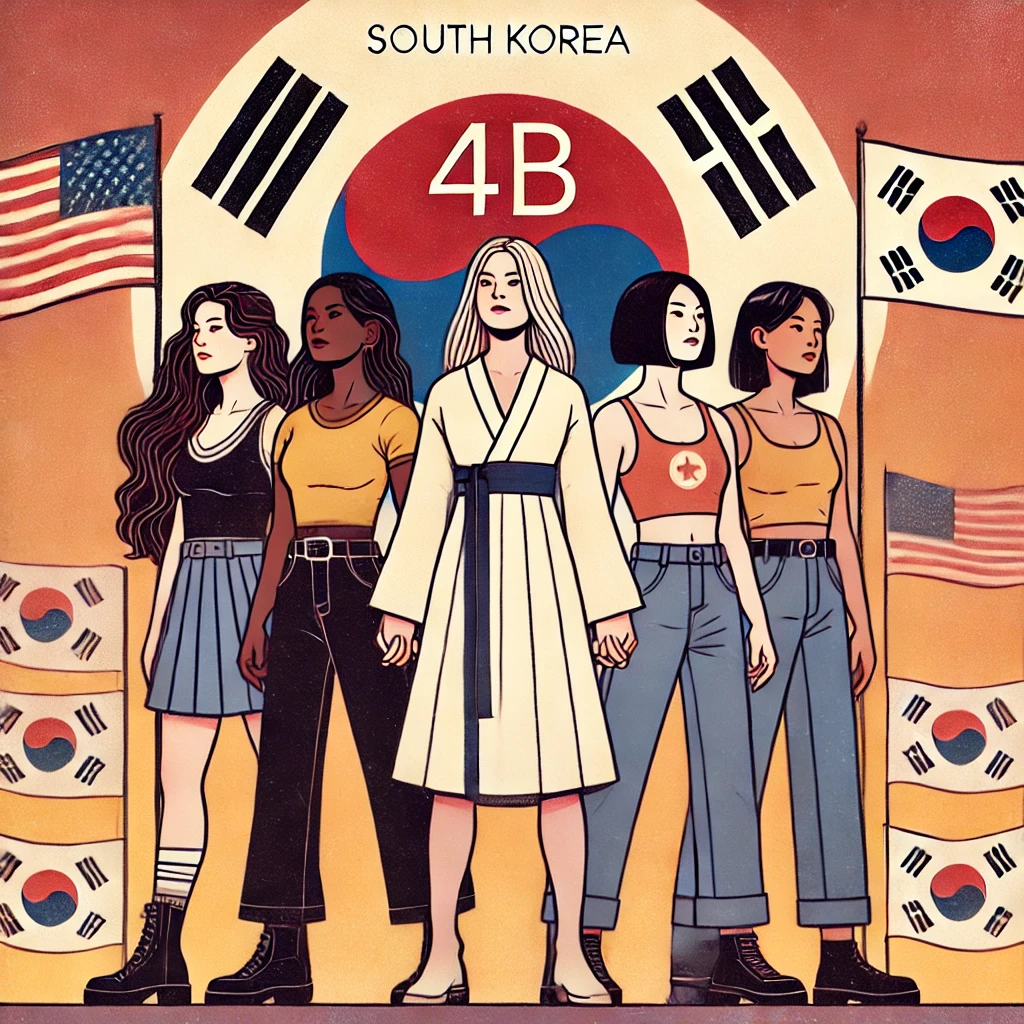In the wake of Donald Trump’s return to the White House, a notable shift has been emerging among women in the United States: a rising interest in South Korea’s 4B feminist movement. This movement, driven by calls for female autonomy and a rejection of traditional relationships with men, has taken on new resonance in the U.S. as women express frustration over issues of bodily autonomy and sexist attitudes linked to Trump’s win.
What is the 4B Movement?
The 4B movement began within South Korean feminist circles during the mid-2010s as a reaction to rising violence against women and enduring social inequalities. “4B” stands for four Korean terms, each beginning with “bi,” which means “no”:
- Bihon (No heterosexual marriage)
- Bichulsan (No childbirth)
- Biyeonae (No dating)
- Bisekseu (No heterosexual sexual relationships)
Initially, the movement aimed to address negative experiences in romantic relationships, challenging traditional expectations and critiquing toxic masculinity. Over time, it expanded into a lifestyle choice for many South Korean women, sparking debate about gender norms and societal roles.
Why Did This Movement Gain Traction in South Korea?
The movement’s roots lie in South Korean women’s growing dissatisfaction with male violence and economic disparity. A 2018 report revealed that, over nine years, hundreds of women in South Korea faced fatal violence from intimate partners. Additionally, women bear a significant financial and social burden, with South Korean men earning 31.2% more on average, according to OECD data.
Adding to this, cultural expectations place most household and childcare responsibilities on women. As inflation rises and economic pressures mount, many women find themselves juggling both careers and domestic duties, often leading to disheartening financial situations and contributing to the country’s record-low birthrate.
The South Korean government’s response to the falling birthrate, including a controversial 2016 map showing the regions with the most “fertile” women, was heavily criticized. This incident led to the slogan “biseksue” (no sexual relationship), as women voiced frustration over being reduced to reproductive potential.
Why American Women Are Turning to 4B Now
Since Trump’s recent electoral victory, young American women have taken to social media platforms like TikTok and X, discussing the 4B movement as a form of resistance. Many feel betrayed by the 46% of women who voted for Trump and disillusioned by the 56.5% of male voters who supported him despite his history of sexist remarks, sexual abuse allegations, and restrictive views on abortion.
Prominent Trump supporters like Nick Fuentes have exacerbated tensions by co-opting the feminist slogan “my body, my choice” into “your body, my choice,” in an effort to undermine female autonomy. Such provocations have driven some women to seriously consider the principles of the 4B movement as a way of reclaiming control.
Trump’s Impact on Women’s Rights
Trump’s previous term included the landmark decision to overturn Roe v. Wade, removing federal abortion rights and leaving decisions to individual states. Although abortion rights were a major talking point in Kamala Harris’s campaign, it proved less decisive for many voters who prioritized economic issues.
Now, with Trump back in office and Republicans controlling the Senate and Supreme Court, fears are mounting over a potential federal abortion ban. Some women’s rights advocates also worry about a revival of the 1873 Comstock Act, which prohibits abortion-related medications and materials—a law dormant for decades.
A Growing Demand for Bodily Autonomy
For American women, Trump’s return signifies a larger struggle over autonomy and respect. Trump’s history of controversial statements about women—like his 2005 comment to Billy Bush where he admitted to non-consensual advances—remains etched in the public’s memory. His sexist rhetoric, as well as disparaging remarks about prominent female figures, has intensified dissatisfaction.
For many, the 4B movement provides an empowering alternative. According to South Korean feminist scholar Euisol Jeong, this movement “encourages women to question the heterosexual, reproductive lifestyle,” often seen as the societal norm. In the U.S., young women now find themselves inspired by this model, contemplating a path that defies conventional expectations and asserting their independence amid an environment they feel has failed them.
Conclusion: Toward a New Feminist Frontier
As American women increasingly explore feminist ideologies like the 4B movement, they’re challenging traditional expectations and redefining what autonomy means for themselves. What started as a South Korean reaction to gender inequality has evolved into an international conversation on women’s rights, giving women in the U.S. a renewed framework to navigate their own cultural landscape.





